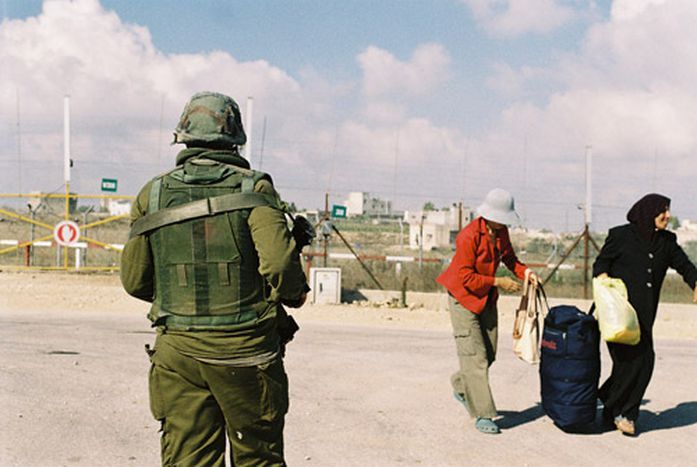
Israeli soldier: 'Arabic language of Middle East'
Published on
Translation by:
Cafebabel ENG (NS)He will finish his military service in October aged 22. Daniel from Tel Aviv is sure of his ideas: Obama, peace, politics, Israel-Palestine, Europe-Turkey... A spontaneous voice far from stereotypes which the media reinforce daily. Interview
cafebabel.com: In September, American president Barack Obama has set a one-year peace deadline for the Middle East. What are your thoughts on this?
Daniel: Well, I’ve lots to say against Obama. He’s certainly not my president and peace certainly won’t come thanks to him. The media have really exaggerated his declaration; it’s ridiculous. Obama has made many mistakes. He’s destroyed the peace process. He assumed the role of mediator but we’ve been at square one for years. Iran is the real problem; Obama won’t go to war with Iran. But when this country gets the nuclear bomb the entire Middle East will change, it’s every Middle Eastern citizen’s nightmare. Iran has already said countless times that they will follow the Great Iranian Kingdom’s dream. They want to wipe Israel off the map.
cafebabel.com: Time magazine published an article saying Israelis don’t believe in peace or politics anymore. Israeli writer Ron Leshem also confirmed this, saying that young Israelis are ‘men without a hope for the future’. Is it true?
Daniel: It seems a bit bizarre. I don’t know a single man who doesn’t have hope - we’re more cynical, of course, but we still have dreams. It’s true that life has changed us, we’ve lost some ingenuity and innocence. It’s true that we don’t believe in peace much anymore after all of the failures of the process. Today, politicians have emptied the word ‘peace’ of its meaning, it has political connotations. Real ‘peace’ can only happen between us, if we really want to live in it! It has to come from the citizens.
cafebabel.com: You believe in peace, you’re a soldier – but what would the reaction in Israel be if someone thus refused to do military service?
Daniel: Firstly, believing in peace and being a soldier are not two contradictory things. Those who do refuse risk arrest. If you’re a pacifist you have to sacrifice your freedom for at least a couple of weeks in jail. It would have been shameful for someone of my parent’s generation to refuse military service. Some artists still do today and they’re crucified for that. Today it’s more tolerated. We’re just more critical about the call to arms. The army is a part of our lives though; we all take a holiday after finishing high school and then we enter the service. We don’t ask ourselves whether it’s good or not – it’s as natural as going to university. I often wondered if I’d do military service should I not have had to. The answer has always been no.
cafebabel.com: The Israeli education minister announced compulsory Arabic classes for children from the age of ten in the north of the country. What do you think about that?
Daniel: I know Arabic. It’s a great language, I enjoyed learning it at school instead of French. Not knowing Arabic is a real shame for us Israelis. Many things would’ve gone better had we known more Arabic. It’s the language of the Middle East; I mean, our grandparents speak Arabic here, so we have it in us somewhere. So I agree with the minister’s initiative. Through reading and watching television in Arabic, I’ve come to understand that Arab countries cultivate a rich tradition, not just terrorism. Arabic helps us to read into the hearts of those who are on the other side of the wall.
cafebabel.com: However, the English-language Israeli newspaper Haaretz published a survey stating that 50% of Israeli students aged between fifteen and eighteen don’t want to learn Arabic in school…
Daniel: Yes, I heard about that. It makes me very sad. The problem is that we are afraid of each other. Nonetheless this fear isn’t always justified. Try asking an Arab to give his daughter’s hand in marriage to an Israeli – I’m one hundred percent sure he’d say no. If we knew the language we could eliminate this fear. Many of us hope things can change, especially all of those who live far from the main cities, who have experienced this fear on a bigger scale.
cafebabel.com: The Israeli daily Yedioth Ahranoth (YA) reported that a young Palestinian juvenile was sexually abused him by an Israeli soldier in front of other soldiers. In your three years of military experience, have you ever heard of anything like these popular media stories?
Daniel: Unfortunately this type of thing happens everywhere. I wish it weren’t true, but if it is, I hope they’re imprisoned. It’s not a part of the world that I knew. They’re not men, they’re animals. I’ve anecdotes like one young Palestinian man whose family threatened to kill him after discovering that he was gay. He decided to leave Palestine and some Israeli soldiers helped him to find accommodation in Israel. Compare that to the female Israeli soldier who published pictures of tied-up Palestinian prisoner to her facebook page, with her grinning alongisde. They don’t reflect reality and have given Israel a bad image. I learnt quite the opposite from military service.
Images: (cc) Nick Bygon; (cc) Christopher Chan; (cc) Oxfam Italia/ all courtesy of Flickr; video: GigiRoccati/ Youtube
Translated from I giovani di Tel Aviv: crediamo nella pace, non nella politica!



